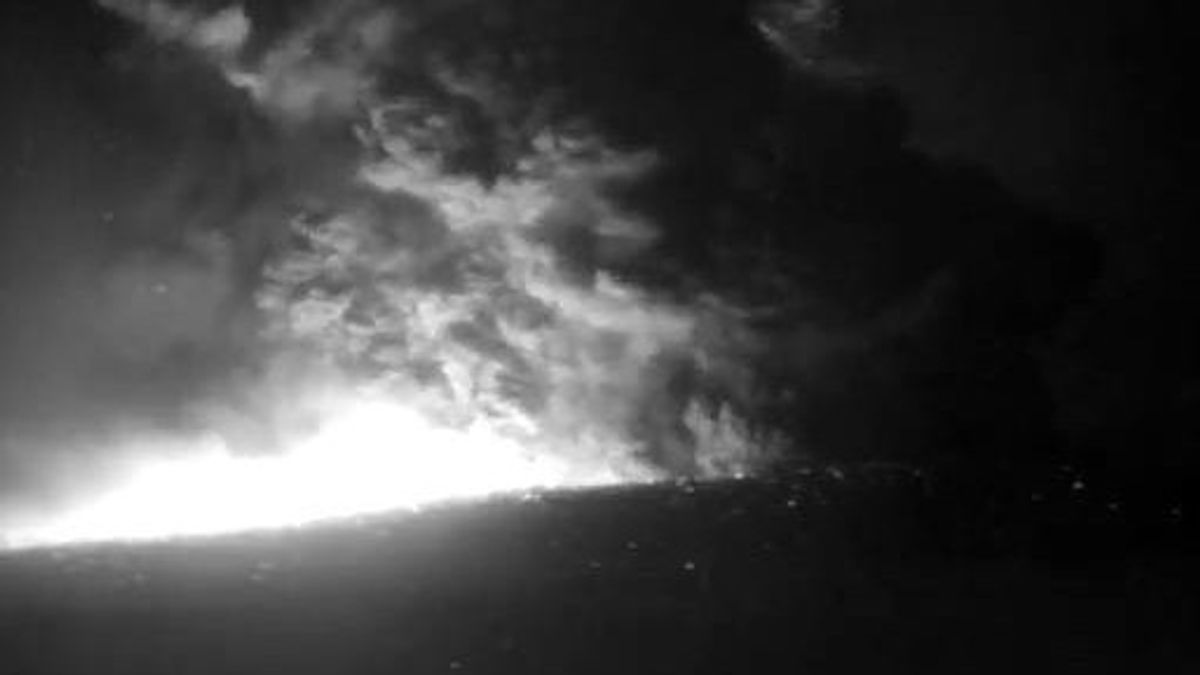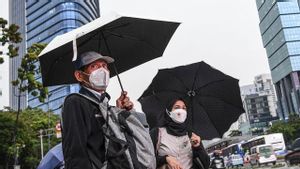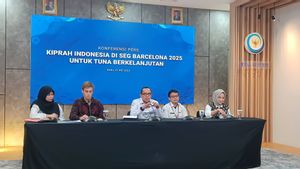JAKARTA - The National Disaster Management Agency (BNPB) stated that the activity status of Mount Anak Krakatau was not raised and was still at level II, namely alert, even though it had experienced an eruption and threw an ash column as high as 657 meters above sea level on Friday night to Saturday early this morning.
Head of the BNPB Head of Data and Communication Services Agus Wibowo explained that when Mount Anak Krakatau erupted, it produced a gray ash column with moderate to thick intensity leaning towards the North. This eruption was recorded on a seismogram with a maximum amplitude of 40 mm and a duration of approximately 38 minutes and 4 seconds.
However, Agus said, the last condition at 04.00 WIB in Rajabasa Subdistrict, South Lampung, was not observed to have the smell of sulfur and volcanic dust, and it started raining.
"TRC BPBD South Lampung Regency has contacted the Krakatau Volcano monitoring team. The status is still on alert (level II) and volcanic activity has subsided. People are advised not to panic," he said, in a written statement received by VOI, in Jakarta, Saturday, April 11.
Although the status of Mount Anak Krakatau has not been raised, the public or tourists are not allowed to approach the crater within a radius of 2 kilometers (km) from the crater.
Security forces, said Agus, were also alerted at the scene to help evacuate residents. Meanwhile, village officials and the local sub-district head were already at the scene giving directions to residents.
Agus said, until this morning there had been no reports of damage, BPBD officers and local officials would continue to monitor and report it.

The bang didn't come from the eruption
The condition of Mount Anak Krakatau was also trending on Twitter with the hashtag #Krakatau. However, before this hashtag, the hashtag #dentuman was already being responded to by citizens.
Surprisingly, on Saturday morning, around 01.40 to 03.00 WIB there was a strange boom that hit the residents of Jakarta and its surroundings. It is believed that the roar was the sound of the eruption of Mount Anak Krakatau.
Head of the Center for Volcanology and Geological Disaster Mitigation (PVMBG) of the Geological Agency of the Ministry of Energy and Mineral Resources (ESDM) Kasbani emphasized that the sound of the boom that was heard in the Jakarta area and its surroundings did not come from the eruption of Mount Anak Krakatau.
Even so, Kasbani did not deny that Mount Anak Krakatau has continued to erupt since Friday until now and has produced volcanic ash columns only 500 meters high.
"Indeed, the mountain is active, there is an eruption but it is small because the threat is only 2 kilometers (KM). Meanwhile, from our post on Carita Beach, which is closest to the mountain, friends did not hear the aforementioned boom," he said, when contacted by VOI.
Kasbani said that so far, based on his monitoring of volcanic activity, the eruption of Mount Anak Krakatau has nothing to do with the explosion that occurred in Jakarta and its surroundings.
"Yes, if we don't hear the closer ones, let alone the far ones? We don't even hear the meaning, maybe it's not related to the activities of Mount Anak Krakatau," he explained.
Previously, Head of the Volcanology Center for Volcanology and Geological Disaster Mitigation (PVMBG) Hendra Gunawan denied that the sound came from Mount Anak Krakatau, which had been erupting since Friday, April 10, at 23.35 WIB.
"Currently, there is still an eruption, this is typical of an eruption with relatively little gas conditions. So if it is related to the incident in Jakarta, this is very difficult to imagine," said Hendra, during a live interview on Elshinta Radio.
"I don't think so (because Mount Anak Krakatau). Too far," he continued.
The English, Chinese, Japanese, Arabic, and French versions are automatically generated by the AI. So there may still be inaccuracies in translating, please always see Indonesian as our main language. (system supported by DigitalSiber.id)













